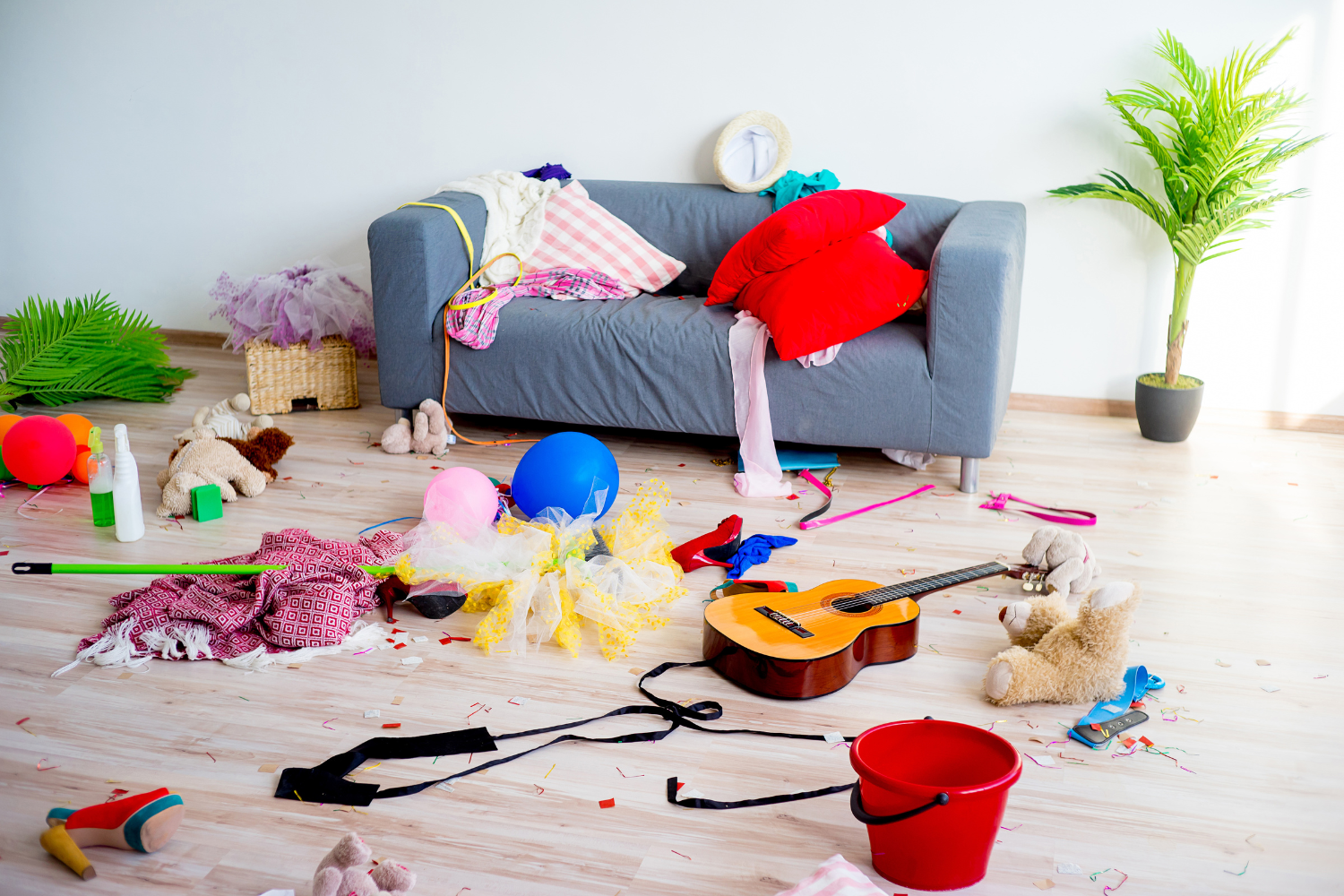How to Cope with Sensory Overwhelm as a Parent
When you become a parent, you know your world is about to change. Most new parents are focused on the things they need to learn to care for their child. How do I feed them? How do I wrap a swaddle? Is this rash normal? Should we sleep train?
Your life becomes foggy with sleep deprivation, and for the birthing parent, healing from delivery.
But one major world-change that rarely comes up in the parenting books is sensory overwhelm. When you bring a baby into your family, you’re also introducing a whole range of sensory stimulation you likely weren’t experiencing before.
There’s the noise of crying, of battery-powered toys, of the washing machine running overtime.
There’s the smell of milk, diapers, the baby’s sweet head.
There’s the sight of baby accessories filling your home: the stroller in the foyer, the burp cloth tossed on the couch, and later, the toddler toys spilling out everywhere.
There’s the new experience of another human physically on your body almost all the time. Of feeling “touched out.”
As this extra sensory input increases, it can lead to overstimulation, which can overwhelm your nervous system. If you (or your partner) wonders why “you’re so angry,” consider that you may be overstimulated.
Maybe you relate to this Facebook post from Megan Kay:
“No, I’m not angry; I’m just trying to sooth a screaming baby, while hearing mom mom mom, with the TV on 88, the dryer going, some random person mowing the lawn, my Apple Watch dinging non stop, my shirt’s too tight, my hair isn’t in a messy bun correctly, there’s crumbs on the floor…I’m not angry, I’m overstimulated AF and need a minute to get myself together. Let me collect myself before you start to accuse me of being in a bad mood.”
TAKING CARE OF YOUR SENSORY NEEDS WHILE CARING FOR A NEWBORN
Clinical Director and Art Therapist Adele Stuckey recommends beginning with a sensory inventory:
“When you wake up, what are the first things you sense? Is your room still dark? Is the sun shining in? Is your room hot or cold? Is your bed comfortable? How do you wake up? Naturally? To an alarm? To the sound of the baby crying?”
Throughout your day, what sensory components affect your ability to feel calm and grounded?
A colicky baby? The dog barking during naptime? Lights too bright? The disorder of laundry or bottles everywhere?
Identifying the sensory stimulation occurring throughout your day can help you learn what you find triggering and what you find calming.
Here are some suggestions for preventing overstimulation while caring for a newborn:
Make sure you have soft clothing that fits. Buy some new pajamas or loungewear for your postpartum body. Ill-fitting clothing can be agitating physically and emotionally.
If you are coparenting with a partner, consider taking shifts through the night. If you are chestfeeding, your partner can wake first with the baby, change their diaper, and get set up for you to begin the feeding. If you are bottle feeding, you can divide the night in shifts.
During nighttime feedings, consider your sensory input. Keep the lights low, use a weighted blanket, take sips of warm or cool water. While baby is feeding, do something for yourself: read, listen to a podcast with headphones, close your eyes, etc.
Consider using unscented or mildly scented baby products: laundry detergent, shampoo, lotion.
Use white noise, pink noise, or gray noise to help baby sleep and to promote your own sleep if baby makes lots of little nighttime noises.
If friends or family ask what they can do to help, consider what will promote your sensory calm: ask if they can pick you up a meal, fold a load of laundry, or clear kitchen clutter.
Acknowledge that some babies cry a lot even when all of their immediate needs are being met. It is okay to put the baby in a safe place, like the bassinet or crib, and step away for a moment to calm yourself and take a break from the noise.
Consider babywearing as a way to free your hands and feel less pinned down. Baby is still on your body, but you can accomplish basic tasks or go for a walk.
TAKING CARE OF YOUR SENSORY NEEDS WHILE CARING FOR A TODDLER
Toddler parenthood is one of the most overwhelming periods for your senses. Toddlers, with their developing brains, still have poor impulse control and emotional regulation skills, so crying is still on the menu. In addition to this, you have whining, constant talking, constant demands, and constant questions.
Here are some suggestions for preventing overstimulation while caring for a toddler:
Minimize “noise toys.” Battery-operated toys are everywhere, and you may not be able to stop family members from buying them, but where you can, keep them at a minimum. (Or take out the batteries!) It’s okay to tell family members that you get easily overstimulated and that you’re trying to cut out extra noise.
Utilize technology to get a sensory break for yourself. If you allow your toddler to have screen time, try to teach them to use headphones. You can also look into headphones for yourself.
Dilute the mayhem: go outside. When you begin to feel overstimulated, going outside may help you feel more grounded. It’s also calming for your child, and loud voices aren’t so intense.
Ask for quiet. For some kids this will just be a prompt to resist and act noisier, but for older toddlers, asking for quiet or telling them that you need to step away and get some quiet may work. “I need to take a little quiet break. I’ll be in my room for ten minutes. Let’s set a timer, and when it goes off, I’ll come right back.”
When in doubt, add water. If your toddler is having an especially difficult day, create a different sensory environment with water. Think wading pools, water tables, bowls of water in the backyard, or a daytime bath. (Adding bath colors, kitchen gadgets, and popsicle snacks are always a hit.) Don’t worry about bathing your child if they don’t like it. Just let them play and enjoy the calm.
Learning to cope with sensory stimuli is an important part of self care, especially in the early, overwhelming years of parenting. We hope these suggestions will help. If this blog has opened your eyes to deeper sensory issues you may be experiencing, working with a therapist can help you to learn more personalized coping strategies.
Alexandria Art Therapy currently has openings for children ages 6+ and adults in the Northern Virginia area and for virtual sessions elsewhere in the US. Send us an email at info@alexandriaarttherapy.com to schedule a free consultation.
Don't miss an update--subscribe to our newsletter on Substack to receive new blog posts & the latest news in your inbox every other week.


